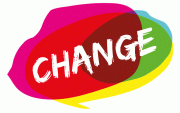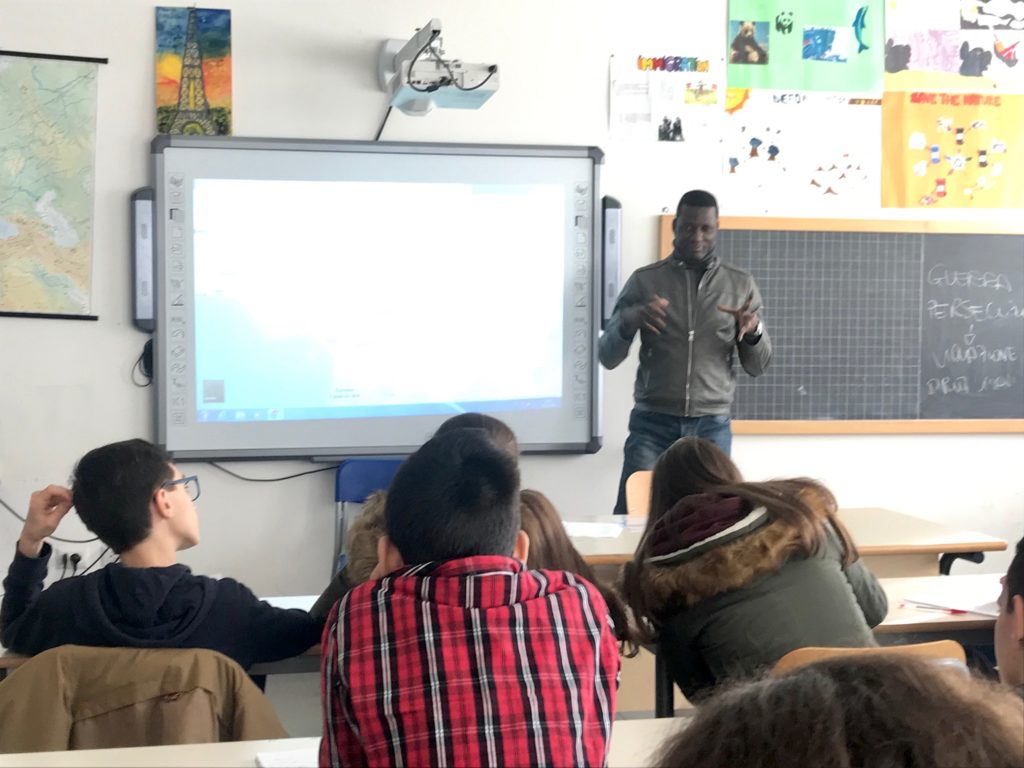Students, teachers and people with an experience of migration have the power to fight intolerance and racism when they think and act together for CHANGE.
– Students are active agents of CHANGE by taking what they have learned in the classroom to the next level.
– Teachers inpire students to put knowledge and energy into shaping the future.
– Refugees and migrants encounter students and share their hopes and dreams for the future.
CHANGE fosters meaningful encounters between different groups of people that might not otherwise meet in order to shift attitudes and perspectives. Once people get to know each other, society can start to CHANGE for the better.
CHANGE partner JRS Italy helps to facilitate encounters between refugees and young people in their classrooms. Refugees have the chance to share their experiences and their hopes for the future while students learn from these first hand perspectives.
A teacher from a high school in Velletri, Italy reflected on this opportunity for encounter and what it meant for her students:
“The story of a life, which has experienced extreme suffering, was presented before the attentive gaze of my students, in an emotional atmosphere of heartfelt participation. In spite of that part of humanity that is afraid of “the Other”, which arrogantly and violently flaunts a feeling of non-acceptance, non-dialogue, non-listening, the children have welcomed the story of a person in a warm embrace. Not only the history of one person, but of many people who have simply chased a need: the recognition of their dignity as persons.”
Here’s what students have to say:
“Vincent’s story really struck me because he was a person who had the strength and courage to express his rights while being aware of the risks. Listening to his testimony allowed me to reflect on the difficulties that the refugees go through. The ideas I had about refugees was partly wrong.” – A Student from Roma (Italy)
Italian version
Capire e ascoltare rispettosamente la storia “dell’altro”
Gli studenti, gli insegnanti e le persone con esperienza sui temi della migrazione hanno il potere di combattere l’intolleranza e il razzismo quando imparano e agiscono insieme per CHANGE.
– Gli studenti sono soggetti attivi di CHANGE perché portano con sé ciò che hanno imparato in classe e lo condividono con gli altri.
– Gli insegnanti motivano gli studenti a usare il sapere e la giusta energia per cambiare il futuro.
– I rifugiati e i migranti incontrano gli studenti e condividono le loro speranze e i loro sogni per il futuro.
CHANGE promuove una serie di incontri significativi tra differenti gruppi di persone, che altrimenti non ne avrebbero l’occasione, con il fine di cambiare atteggiamenti e prospettive. Una volta che le persone si conoscono, la società può iniziare a cambiare per il meglio.
Il partner italiano di CHANGE, JRS Italy – Centro Astalli, aiuta a favorire incontri tra rifugiati e giovani nelle scuole. I rifugiati hanno l’occasione di condividere le loro esperienze e le loro speranze per il futuro, mentre gli studenti entrano in contatto con nuove prospettive.
Un’insegnante di un liceo di Velletri, in Italia, riflette su questa opportunità d’incontro e spiega cosa quest’ultima ha significato per i suoi studenti:
“Il racconto drammatico di una vita che ha conosciuto sofferenze estreme e che ha incrociato la morte in più di un’occasione, si è proposto allo sguardo attento della giovane platea, in un’atmosfera emozionata di sentita partecipazione. A dispetto di quella parte di umanità che ha paura dell’Altro, che ostenta in modo arrogante e violento un sentimento di non-accettazione, non-dialogo, non-ascolto, i ragazzi hanno saputo accogliere in un caloroso abbraccio la storia non di uno, ma di tanti che hanno semplicemente rincorso un bisogno: il riconoscimento della propria dignità di persone.”
Ecco cosa hanno da dire gli studenti:
“La storia di Vincent mi ha colpito veramente perché è una persona che ha avuto forza e coraggio nel manifestare i propri diritti pur essendo a conoscenza dei rischi che correva. Ascoltare la sua testimonianza mi ha permesso di riflettere sulla poca importanza delle differenze e sulle difficoltà che attraversano i rifugiati. L’idea che mi era fatta sul di loro era in parte sbagliata.” – Una studentessa di Roma (Italia)

